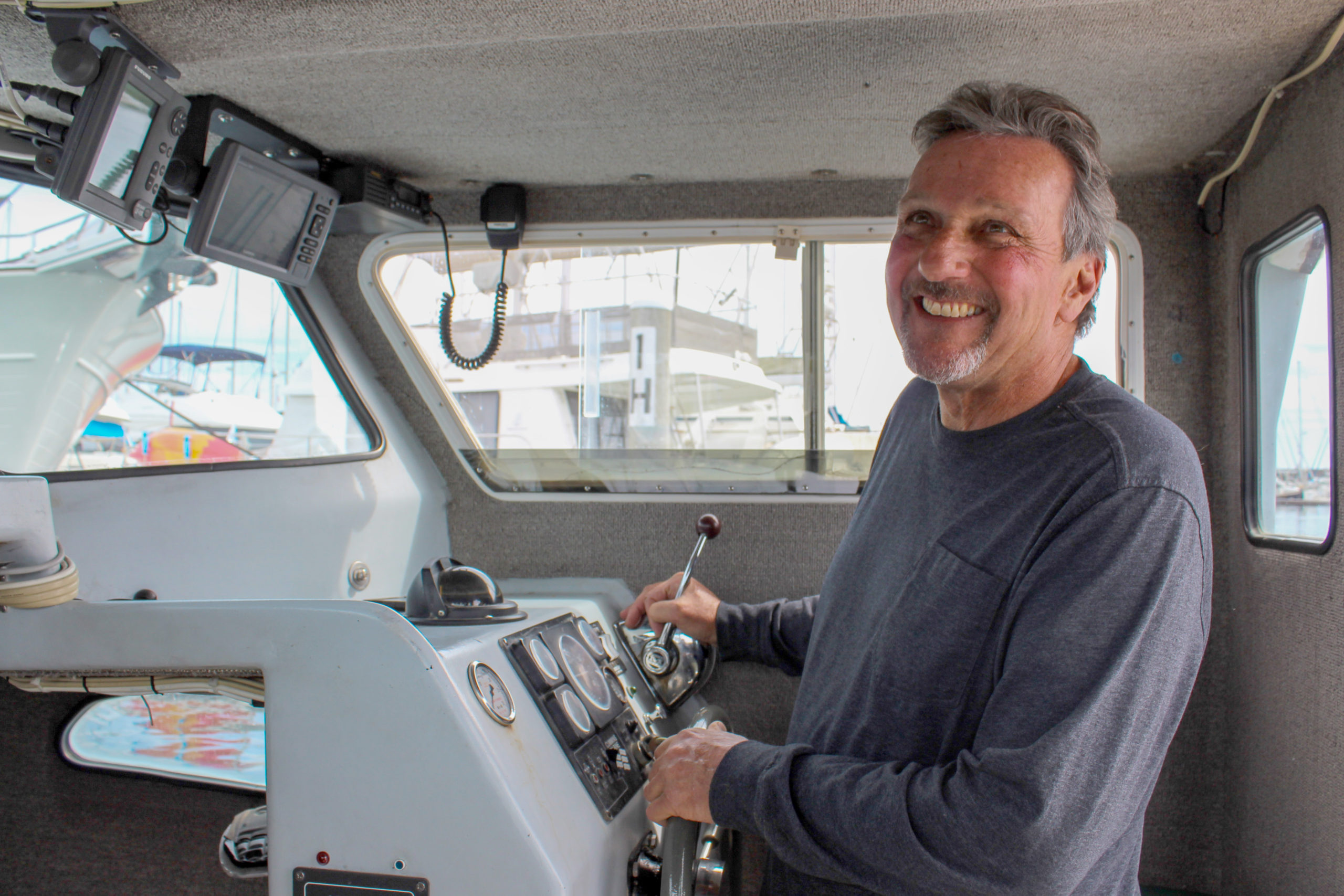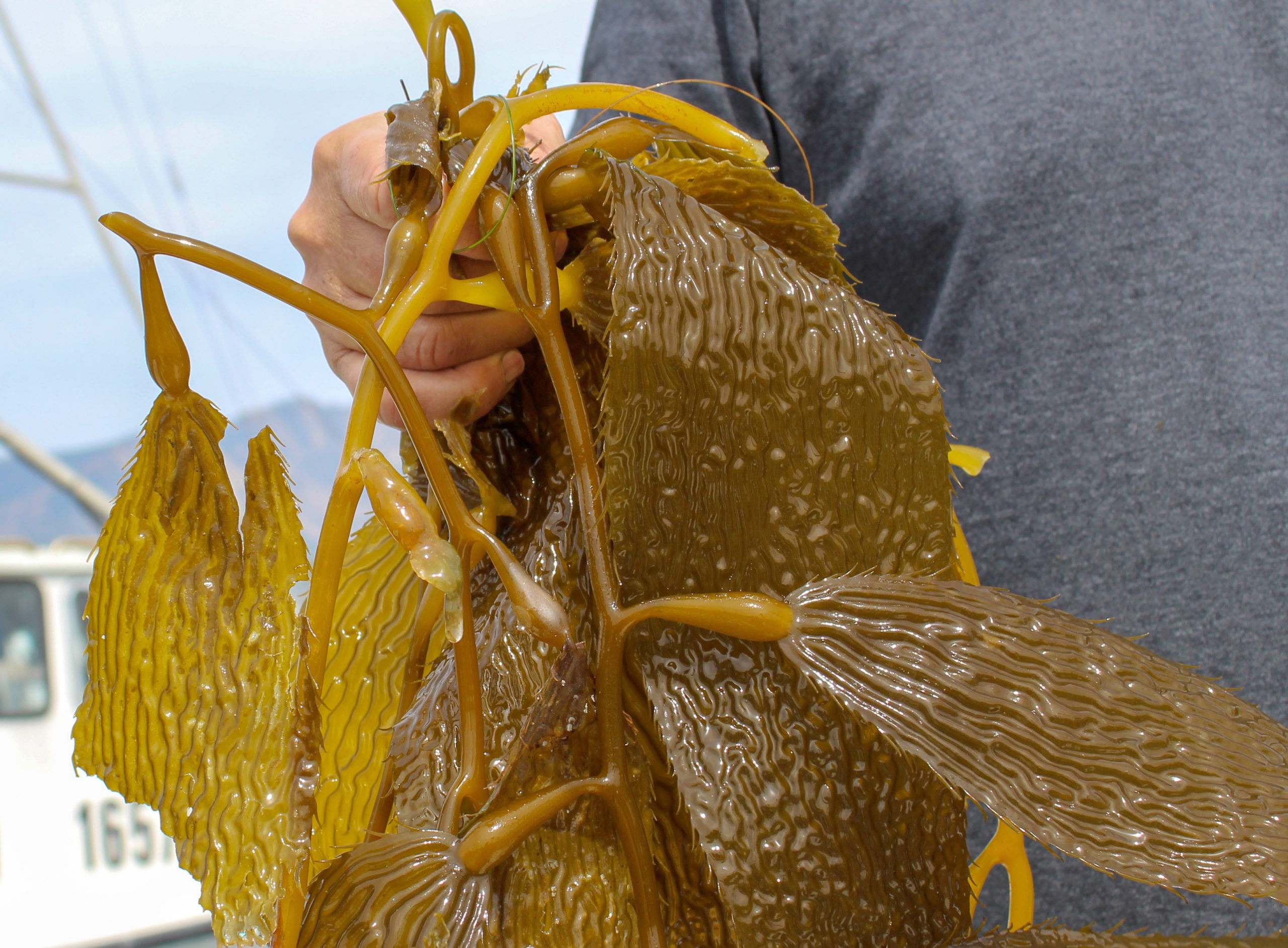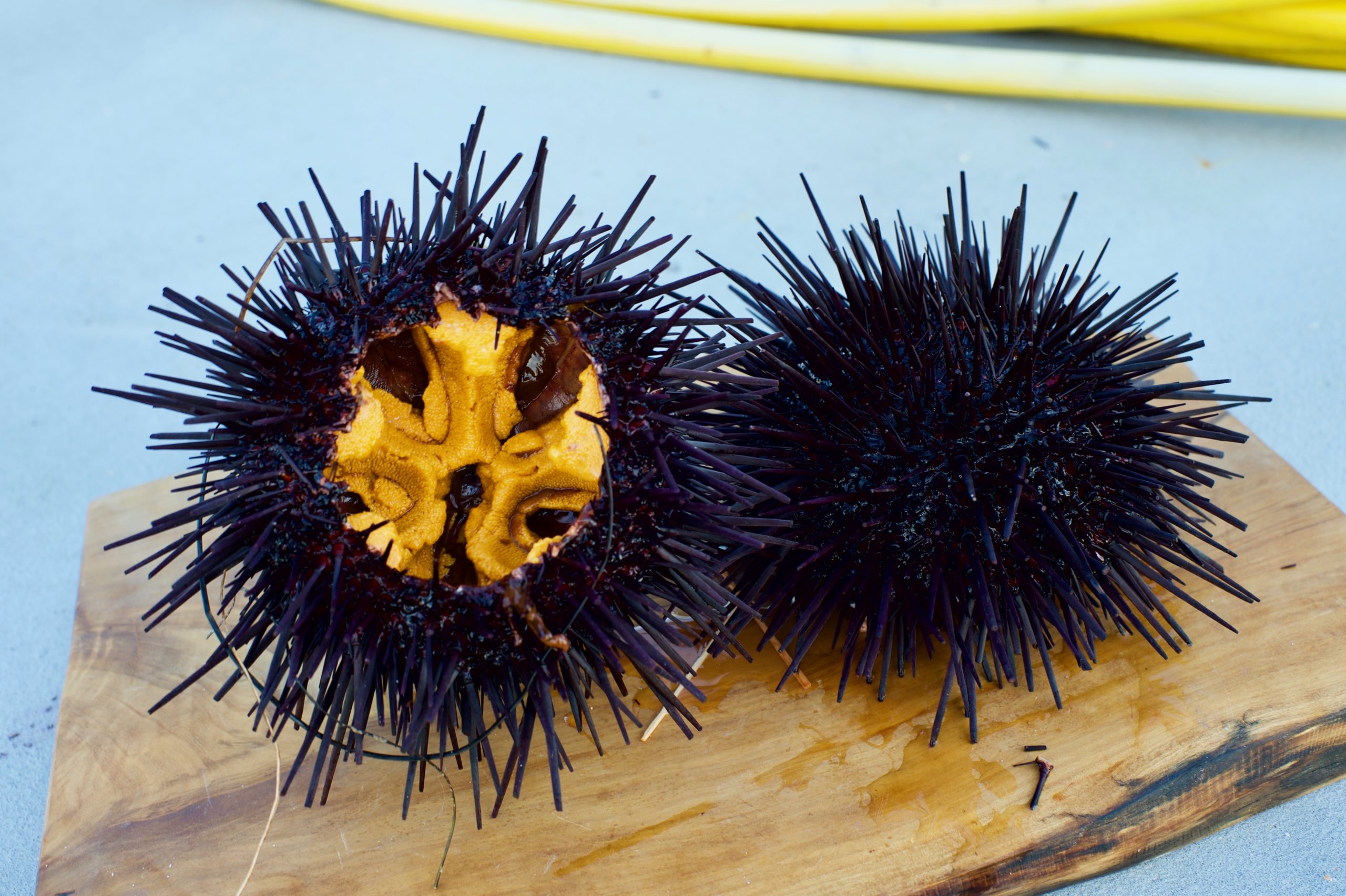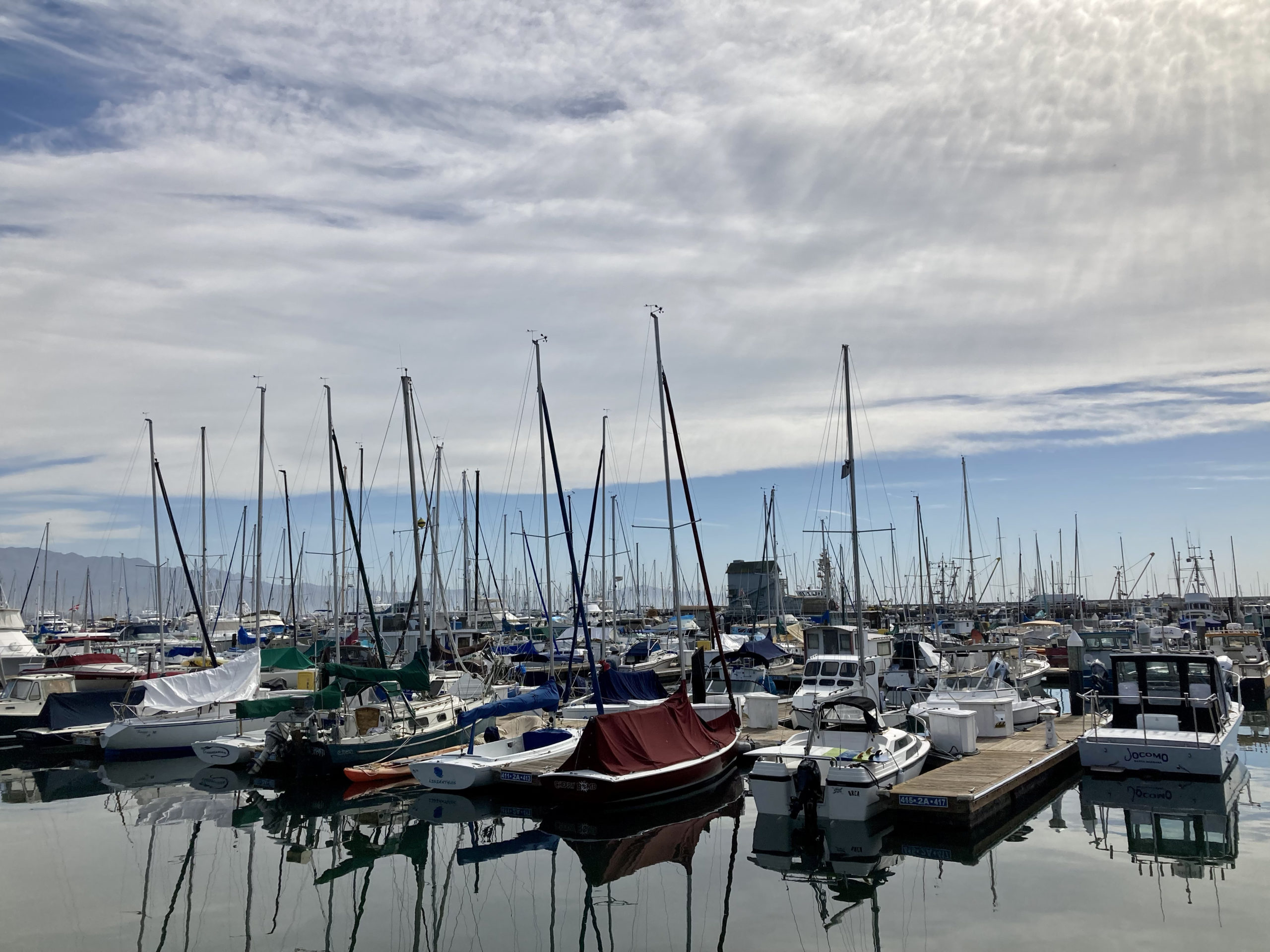
The impact of climate change
We are finding, coaching and training public media’s next generation. This #nprnextgenradio project is created in southern California, where five talented reporters are participating in a week-long state-of-the-art training program.
In this project we are highlighting the experiences of people whose lives are being affected by climate change.
Aarohi Sheth speak with Jeff Maassen, who has worked as a sea urchin diver for 40 years in Santa Barbara and is concerned about the effects of climate change on the marine ecosystem and his business.
Illustration by Emily Whang
Dying kelp leaves sea urchin diver Jeff Maassen uncertain about his trade
The ocean has been a haven for sea urchin diver Jeff Maassen for more than four decades, a place where the Santa Barbara resident fishes, surfs, dives and makes his livelihood.
His smile fills his face as he drives his 30-year-old boat out of the Santa Barbara Harbor. He puts the boat in neutral to watch the seals bounce around on a buoy and shares that over his 40-some years working as a sea urchin diver, he’s noticed the deterioration of the marine ecosystem because of climate change. He worries about the state of the ocean as well as his seafood production business.
“I’m doing everything I can as a longtime commercial fisherman and stakeholder in the community to support and enhance ecosystems and to thwart this climate change,” Maassen says.
When the sea urchin business started to thrive — the roe, or eggs, are scooped out to make uni sushi — Maassen saw an opportunity to make money doing something he loved. “I became a sea urchin diver because it seemed like it was a natural evolution, being a surfer, a diver and an ocean recreator,” Maassen says.
Soon after, he built a boat to dive for urchins full time.
Climate change affecting sea urchin industry

Jeff Maassen smiles as he takes his 30-year-old boat out into the waters of the Santa Barbara Harbor on March 15. Photo by Aarohi Sheth.
“I enjoy being out in the open and jumping over the side [of the boat], swimming through the water not knowing what you’re doing to see,” Maassen says. “The seals that come up and play with you, the fish that are around you. [The ocean] is an incredible office to experience, and I truly feel blessed to have been able to do this.”
But his business could be in trouble because of the rapid decline of kelp, which makes up a majority of sea urchins’ diet and provides “nurseries” for other marine life.
On the boat, Maassen points to a spot in the ocean where a few pieces of kelp are floating on the water’s surface. “This kelp bed used to span the length of the coast to the Mexican border and even beyond,” Maassen says, some 250 miles. “And there’s not much left right now.”

Sea urchin diver Jeff Maassen holds up kelp, a sea urchin’s main food source, in Santa Barbara Harbor on March 15. Because of climate change, there is a decline in the amount of kelp in the ocean, leaving urchins hungry and in turn, not healthy enough to sell. Photo by Aarohi Sheth.
According to UC Santa Cruz researchers, kelp forests off the coast of Northern California have decreased by more than 95% in recent years. They found in a 2021 study that the kelp has been replaced by “urchin barrens,” or explosions of purple sea urchins that take up the entire seafloor and destroy kelp and algae, leaving even less food for other marine life, including the red sea urchins that Maassen harvests.
“When you have millions and millions of pounds of sea urchins just moving around looking for food and there isn’t any, they’re barely surviving,” Maassen says. “That’s [totally] going to impact my industry [and] my sea urchin dive business. It’s going to make it harder.”
As temperatures continue to rise with global warming and kelp forests disappear, sea urchins have to resort to eating phytoplankton, growth on the ocean floor, or “bottom scum,” according to Maassen.
“[The sea urchins] are barely staying alive,” he says.
If sea urchins aren’t getting the food or nutrients they need, they produce less roe, making them unharvestable and essentially, worthless to fishermen like Maassen.
Maassen is worried about the other changes he’s seen in the ocean, too.
Maassen says the seals and sea lions that would once flop around the waters of the Channel Islands have moved north in search of food and shelter. So have squid.
But because the globe is experiencing a La Niña phenomenon this year — meaning that the Pacific Ocean is cooler for the moment — there’s a “rebounding of [the] ecosystem” or a “sense of normalcy” that spills over the environment.
“What we really don’t know is how long that will last,” Maassen says.

A healthy sea urchin, like this one, is full of yellow roe when it is cut open. The roe is harvested for uni sushi. If the urchins are eating enough healthy kelp, they’ll have more roe, but the lack of kelp can decrease the roe production making the urchins unsellable. Photo Courtesy of Morgan Maassen.

The Santa Barbara Harbor is home to Jeff Maassen’s boat on March 15. Maassen has been diving for sea urchins and selling them for seafood for more than 40 years. Photo by Aarohi Sheth.
Maassen wants to see more effort being put into regenerating kelp forests and implementing a more efficient — and effective — strategy for adapting to climate change.
As climate change continues to loom over marine ecosystems and seafood production businesses, Maassen feels a sense of urgency to preserve the ocean that is the source of his livelihood but also his home.
“Not enough is being done fast enough and interestingly, it’s up to your generation to really step up to the plate and try to motivate with that,” Maassen says. “I’m almost done. It’s unfortunately up to you.”
